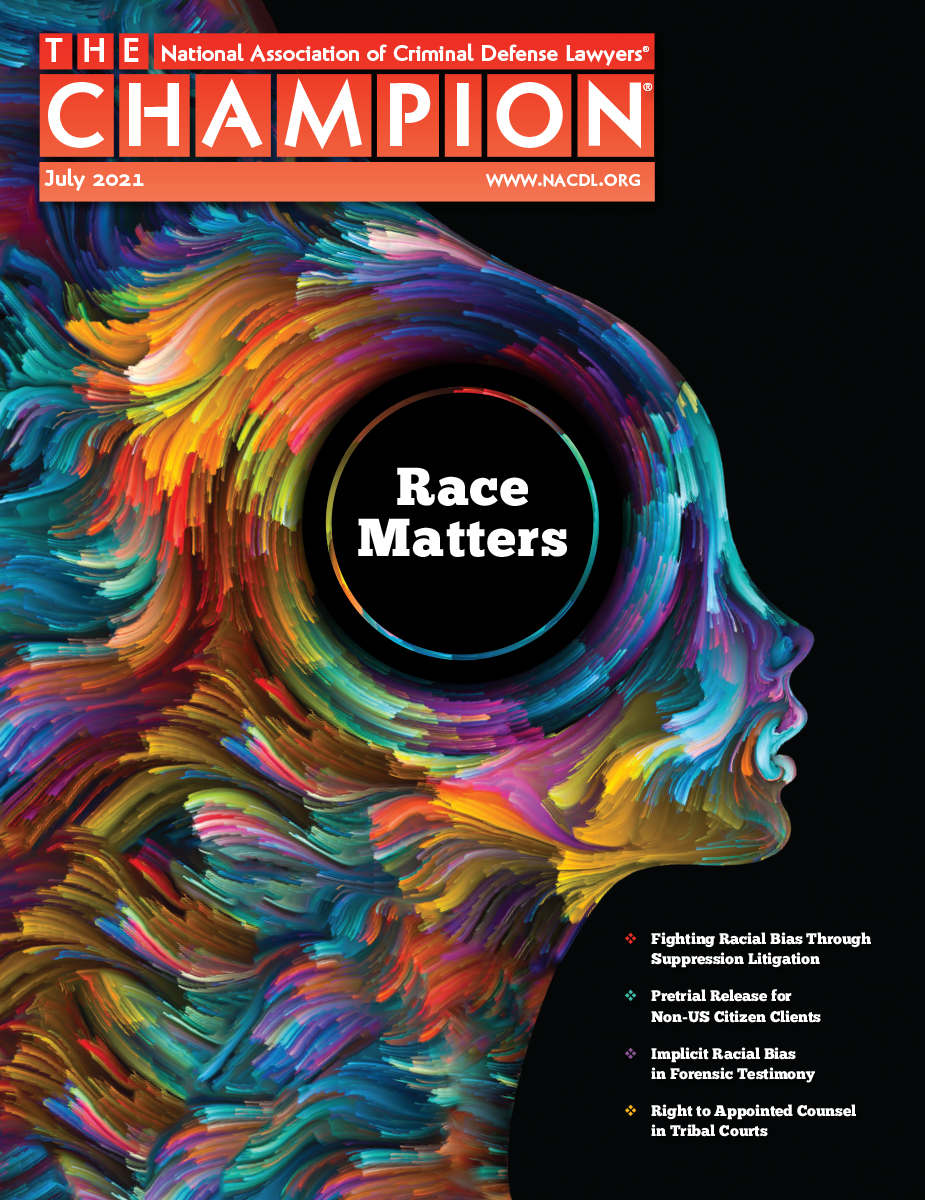July 2021

Upon what basis can defense counsel bring a motion to suppress evidence when the police target people of color using pretextual traffic violations?
Articles in this Issue
-
Affiliate News
What events are NACDL affiliates hosting this month? Find out here.
-
Book Review: A Descending Spiral by Marc Bookman
This month David R. Dow reviews A Descending Spiral: Exposing the Death Penalty in 12 Essays by Marc Bookman.
-
Book Review: Bones of Black Saints by Alex Charns
This month Bob Hurley reviews Bones of Black Saints by Alex Charns.
-
Book Review: Caste: The Origins of Our Discontents by Isabel Wilkerson
This month Teresa J. “Teri” Sopp reviews Caste: The Origins of Our Discontents by Isabel Wilkerson.
-
Book Review: Deep Delta Justice by Matthew Van Meter
This month Jon Sands reviews Deep Delta Justice: A Black Teen, His Lawyer, and Their Groundbreaking Battle for Civil Rights in the South by Matthew Van Meter.
-
Fighting Racial Bias by the Police Through Suppression Litigation
The police regularly target people of color by using pretextual vehicle and traffic violations – including illegal window tint and disobeying a crosswalk signal – to justify the initial interaction. The goal of police officers is to escalate the encounter with false allegations of the smell of marijuana or furtive movements to enable them to conduct a full-blown search. How can defense counsel make a motion to suppress evidence based upon an allegation of racial targeting?
-
From the President: A Year in Review
What did we learn about NACDL as an organization during the challenge of the pandemic?
-
Music Review: No Noose: Musicians United to End the Death Penalty
This month Marvin Miller reviews “No Noose” by Musicians United to End the Death Penalty.
-
Perspective: There Should Be a Right to Appointed Counsel for Indigent Persons
Facing Imprisonment in Tribal Courts
An indigent Native American who is charged in tribal court, facing a year in jail, with all the consequences of confinement — loss of employment, etc. — is not entitled to appointed counsel, only counsel at his or her own expense if the possible punishment is a year or less. Tova Indritz argues that there should be a right to appointed counsel for any indigent person facing imprisonment anywhere in the United States, including in tribal courts.
-
Pretrial Release for Non-US Citizen Clients: One Front of the War for Racial Justice
Amy Kimpel and James Chavez explain how to get non-U.S. citizen clients (both those with legal status and those who are undocumented) out of custody and how to keep them out. Their article will inspire defense advocates to fight for pretrial release for non-U.S. citizen clients and will provide legal ammunition for the battle.
-
Racism — A Persistent Challenge That Impacts Everyone
Racism — A Persistent Challenge That Impacts Everyone
-
The NACDL Q&A: Fighting for Justice in a Divided World
What can be done to achieve racial justice in the United States? How can society repair the chasm between the police and people of color? Three public defenders tackle these questions and more in the NACDL Q&A.
-
The Role of Implicit Racial Bias in Forensic Testimony
Implicit racial bias in forensic testimony cannot be ignored as a primary driver of injustice. Janis Puracal discusses how implicit racial bias can impact forensic testimony, and she shares her family’s story.
